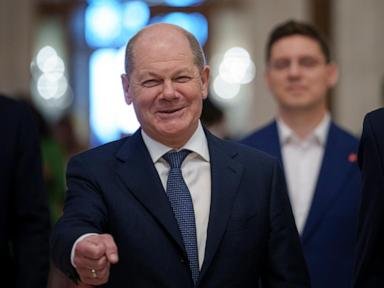BEIJING — German Chancellor Olaf Scholz arrived in China on Sunday on a visit focused on the increasingly tense economic relationship between the sides and differences over Russia’s invasion of Ukraine.
Scholz’s first destination was the industrial hub of Chongqing, where he and his delegation of ministers and business leaders were to visit a partially German-funded company and other sites in the vast city, which is a production base for China’s auto and other industries.
Scholz is also scheduled to visit the financial hub of Shanghai during his three-day visit, before traveling to the capital, Beijing, to meet with Chinese leader Xi Jinping and Premier Li Qiang.
German companies such as BMW and Volkswagen are highly reliant on the Chinese market, but Beijing’s support for Russia creates frictions with the West.
Germany’s economy has benefited from China’s demand for investment and manufactured items from cars to chemicals, but those ties have frayed amid increasing competition from Chinese companies and tightened regulations. Political interference has also been blamed for a sharp drop in foreign investment.
German companies have argued they face unfair market barriers in China and the government has pushed for a policy of “de-risking” to reduce reliance on the Chinese market and suppliers.
Despite that, China remained Germany’s top trading partner for the eighth straight year in 2023, with 254.1 billion euros ($271 billion) in goods and services exchanged between the sides, slightly more than what Germany traded with the U.S. but a 15.5% contraction from the year before. German exports to China totaled 97.3 billion euros ($104 billion), according to Germany’s Federal Statistical Office, although figures have varied depending on exchange rate fluctuations and rounding of numbers.
Chinese state broadcaster CCTV showed Scholz descending from his plane in Chonqing and leaving in a motorcade, but did not carry any comments made to the welcoming delegation.
Prior to his arrival, Scholz posted on social platform X that he had discussed the “massive” Russian air attacks on civilian energy infrastructure with Ukrainian President Volodymyr Zelenskyy on Saturday, and declared that Berlin will “stand unbreakably by Ukraine’s side.”
China has refused to criticize Russian aggression. It has maintained trade relations with President Vladimir Putin’s government and aligned its foreign policy with Moscow in opposition to the U.S.-led liberal political order, while touting its authoritarian one-party system as a superior alternative.
After visiting a hydrogen motor production facility run by German firm Bosch, Scholz toured the city with young architects and was to go on a boat cruise on the famed Yangtze River, one of two mighty waterways that partly surround the city perched on overlooking cliffs.
Following a visit Monday to Shanghai, Scholz will fly to Beijing and meet with Xi Tuesday at the Diaoyutai State Guesthouse before being received with military honors by Li at the Great Hall of the People, the seat of the ceremonial legislature in the heart of the Chinese capital. Further visits and meetings will follow before he departs late Wednesday night.
This is Scholz’s second trip to China since he became chancellor in late 2021. His previous visit was in November 2022 and essentially was a one-day trip because of the strict COVID restrictions still in place at the time.
It is his first visit since the German government last year presented its China strategy, which met with criticism from Beijing. Premier Li and a delegation of senior officials visited Berlin in June.
___
Associated Press reporter Geir Moulson contributed to this report from Berlin.
